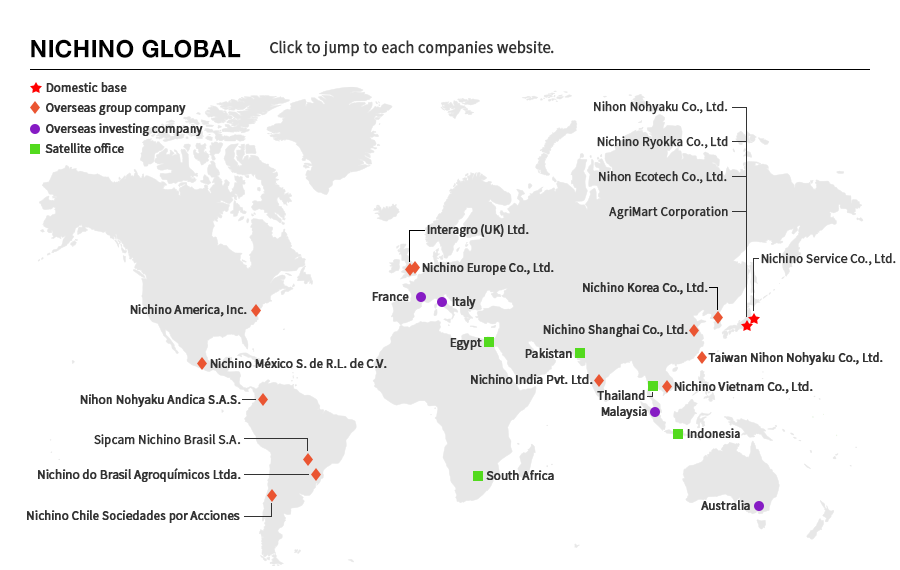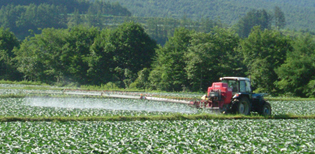Environmental Conservation
- Consideration for Biodiversity
- Water Conservation
- Initiatives to Reduce Waste
- Initiatives for Raw Materials
- Response to Environmental Problems
- Initiatives for Environmental Assessment
- Scope 3 Emissions
- TOPICS
The rapid development of the heavy and chemical industries after World War II left a negative legacy of environmental problems. Keenly aware of their part in this legacy, companies have achieved solutions through various measures and technological innovations, but many underlying problems still remain. As a chemical industry company, the main businesses of NICHINO Group have a close relationship with the natural environment. Therefore, environmental preservation is an important issue for our future. We engage in proper environmental compliance management in relation to laws, regulations, and agrochemical registration systems in R&D and throughout the product life cycle.
Consideration for Biodiversity
Agrochemicals are required to be effective against pests and weeds, and to be safe for users and consumers of agricultural products. They are also required to be considerate of the natural environment around the farmland. The Group complies with the laws and regulations of each country and works to develop agrochemicals that are closely aligned with the perspectives of “the environment, safety and health,” by utilizing the latest scientific knowledge. Nichino Ryokka utilizes its products and weed management technology to participate in the “Satochi-Satoyama (Socio-ecological Production Landscape) Revitalization Project by Industry, Academia, and Government” in Nasukarasuyama City, Tochigi Prefecture. The company also contributes to biodiversity by conserving the landscape. Nihon Nohyaku participates in CropLife JAPAN (formerly known as Japan Crop Protection Association)’s “Bee Friendship Plan.” It grows plants preferred by pollinating insects such as bees on part of the company premises to provide a proper habitat for pollinating insects. Group companies and offices will continue to consider and promote initiatives that contribute to biodiversity.
Water Conservation
The Group works to reduce water usage through efforts in improving production efficiency, saving water, and recycling. We also thoroughly treat wastewater and manage water quality, complying with legal wastewater standards and standards set by local ordinances in the areas where our plants and research facilities are located. In Japan, we have set voluntary control values for wastewater that are stricter than the legal standards, and we manage the wastewater to ensure that it does not exceed the standard values.
Initiatives to Reduce Waste
The Group actively works on the 3Rs (reduce, reuse, and recycle), and Nichino Service promotes the goal of zero emissions*. For some products, we offer multiple specifications tailored to each customer’s needs. By allowing each customer to purchase an optimal amount based on their needs, we work to reduce waste agrochemicals and the amount of packaging used. AgriMart is working to reduce the amount of plastic used. In FY2023, the company changed the specifications of some of its products from 500 g to 1 kg to reflect actual usage. Furthermore, we focus on reducing waste through green purchasing (purchasing products and materials from manufacturers that strive to reduce their environmental impact, including waste reduction), and we have joined the Green Purchasing Network. In FY2023, we achieved a green purchasing rate of 99.9% for the entire domestic Group, thereby achieving our goal (over 95%). The entire Group will continue to work together as one to advance waste reduction efforts.
* The final landfill amount of waste shall be less than 1% of generated volume
Initiatives for Raw Materials
Some of our products use packaging made with plant-based biomass ink and rice bran-derived rice ink. In general, the raw materials for ink are mainly derived from petroleum. Therefore, by replacing petroleum-based ink with biomass ink and rice ink, we can reduce the amount of petroleum resources used. In addition, the Group has formulated the “NICHINO Group Basic Procurement Policy” and the “NICHINO Group Green Procurement Standards,” and we take the environment into consideration when we conduct material procurement.
Response to Environmental Problems
The Group share problems that occur at Group companies within the Group as they arise. We then use these cases as lessons to roll out preventive measures and improvement initiatives to other offices within the Group, while also providing environmental education.
Initiatives for Environmental Assessment
The Group works on environmental assessment through Responsible Care activities and ISO 14001 (Environment Management System). We thoroughly comply with environmental laws, ordinances, and local agreements, etc. We promote business activities while taking into account our effect on the surrounding areas, considering factors such as the generation of noise, odor, or vibration.
Scope 3 Emissions
Regarding our domestic CO2 emissions, the Group has always disclosed Scope 1 (direct emissions of GHG by the reporting company) and Scope 2 (indirect emissions from the use of electricity, heat, or steam supplied by others) emissions. From FY2020, we also started disclosing our global CO2 emissions, including those in India and Brazil where we have manufacturing sites
Furthermore, we have calculated and disclosed Scope 3 (other indirect emissions besides Scope 1 and Scope 2, emissions from the corporate value chain) emissions from FY2021 in Japan* and from FY2022 overseas**.
*: Nihon Nohyaku and domestic Group companies that have manufacturing sites
**: Overseas Group companies that have manufacturing sites
TOPICS
Promoting Environmental Conservation Initiatives at Work and at Home
To ensure that employees are fully aware of environmental laws and regulations and to promote environmental conservation initiatives at work and at home, the Environment Safety & Quality Assurance Department issues the “Environment Safety News” newsletter three times a year to share information with all employees. The newsletter features information related to environmental safety.
Global Warming Countermeasures
In conjunction with “Environment Day” on June 5, we hold activities to raise employee awareness of environmental conservation. We promote these activities so that each employee will have an opportunity to think about global warming countermeasures through familiar actions and measures that they can take at home.
Plastic Reduction
We conduct awareness-raising activities through Environment Safety News and other means, concerning actions that individuals can take to reduce their plastic usage. Moreover, as part of our initiatives for the workplace, we work on green purchasing, which promotes the purchase of items that have a lower environmental impact, such as recycled plastic products.








